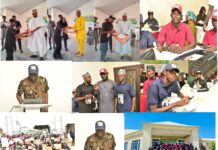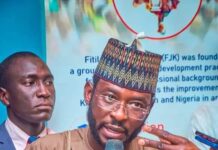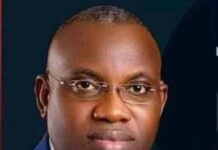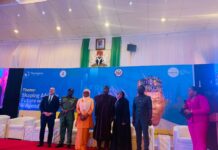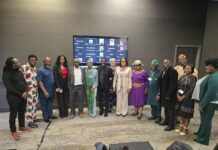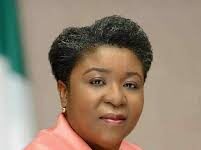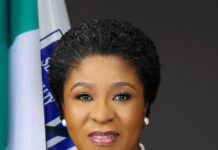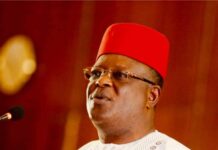2023: APC Must Accept Challenges In Meeting Up Campaign Promises, Lukman
POLITICS DIGEST – As political parties strategize ahead of the 2023 general elections, Director General of the Progressives Governors Forum (PGF), Salihu Moh Lukman, has called on the leadership of the ruling All Progressives Congress (APC), to admit the numerous challenges confronting the party and it’s President Muhammadu Buhari led administration in fulfilling it’s campaign promises to Nigerians
Lukman, who stated that the call has become very necessary in view of the numerous inherited challenge challenges that is confronting the President Muhammadu Buhari administration, regretted that in Nigeria, citizens are more and more divided, amidst conflicts, violence and wars, which he noted is consuming human lives and properties in a scale that is very alarming.
The PGF DG, who stated in a statement he titled, “Nigeria’s Challenges and Need for Réorientation” argued that though there is no doubt that the ruling party inherited a battered system from the now opposition Peoples Democratic Party (PDP) in 2015, the party may not had fared well in confronting the challenges it met on ground
Citing the Rwandan experience, Lukman, who challenged Nigerians leaders to develope a problem solving mechanism rather than the continuous blame game, warned that the nation’s challenges are more likely to get worse if nothing is done to arrest the situation .”It is hardly disputable that PDP mismanaged and squandered opportunities for sixteen years between 1999 and 2015. No need to go into details as that is not the focus. What is more important at this point is the recognition that it was easy for Nigerians to register their support for APC, and on that account voted PDP out of power in 2015.
“Of course, there were contextual factors, which made the APC to win the support of Nigerians. These factors include the successful merger of defunct opposition parties – Action Congress of Nigeria (ACN), All Nigeria Peoples Party (ANPP), Congress for Progressives Change (CPC) and Owelle Rochas Okorocha’s faction of the All Progressives Grand Alliance (APGA) – combined with relatively transparent processes of candidate selection for the 2015 elections, especially the Presidential Candidate, together with all the inspiring campaign promises and the personality of President Muhammadu Buhari as the Presidential Candidate of the APC. With all these, the APC was able to win the 2015 elections and Nigerians had very high expectations.
“The question is, to what extent did the APC and its governments meet or are meeting the expectations of Nigerians? What are the challenges and how is the APC and its governments responding to these challenges? Compared to PDP, how different is the APC?
“The fundamental issue is the question of the extent to which APC leaders and members are responding to challenges. Are we taking responsibility? The good thing is that, in APC, leaders are not in denial of the challenges. This was not the case with PDP before 2015 and up this moment. However, being members of the APC, we should be able to acknowledge too that although, the slogan of the APC is CHANGE, which underlines the commitment of the party and its leadership to bring about change in the country, the programmatic details as articulated in the party’s manifesto require a mobilisation programme in order to win the support of Nigerians.
“One of the big gaps confronting the APC, which unfortunately makes it easy for opposition politicians to dent the party and its governments’ is the absence of mobilisation programme to engage Nigerians to take responsibility in their different fields of endevours in responding to challenges facing the country. Getting Nigerians to take responsibility in their different fields of endevours in responding to challenges facing the country is a critical success factor in terms of producing the change envisioned by the APC and its leadership as articulated in the manifesto of the party.”
Read Also:
The Progressive Governors DG argued further that despite the wide recognition and acknowledgement that the challenges facing Nigeria as a nation are deep rooted, it will require a robust programme of reorientation in the country to sustain the envisioned change APC and its leadership are working to achieve, adding that “once the focus and scope of initiatives is limited to operations of government institutions, and non-governmental institutions continue with business-as-usual practices, most of the challenges facing the country will linger.
” For instance, take the case of insecurity, which is the most important threat to the survival of the country. As much as combative military operations against insurgency in all its manifestations – banditry, kidnappings, abductions, etc. – is fundamental to restoring order and protection of lives and property in the country, equally important is also how Nigerians across all strata of social life are being mobilised to take responsibility in restoring order and guaranteeing security of life and property in every part of the country. How is government working to raise awareness of Nigerians in terms of what to look out for as danger signals in our different communities? What kind of conducts by citizens, including community leaders constitute risk factors and therefore indicative of security challenges? What should be done, where and who to report to? What other initiatives should citizens take?
“Most of these issues are at best taken for granted. There is hardly any planned campaign taking place at national level to mobilise Nigerians with specific sets of detailed responses. Because issues of public awareness around these issues are taken for granted, everybody, both leaders and followers are just ‘complaining and wailing
“To be different, APC members should be able to appeal to the party’s leaders to urgently develop a a strong mobilisation campaign that can connect citizens with all the initiatives of government. As part of such mobilisation campaign, raising public awareness about the initiatives’ government is taking should be a priority. The second thing is also to be able to provide feedback to government about the effectiveness of initiatives taken by APC governments’ so far. To what extent are government initiatives responding to challenges? How are government initiatives’ being able to envision new realities or at least give new insights to old realities? What are the expected roles of citizens in their different fields of endevours to achieve envisioned realities? In particular, how is government mobilisation programme succeeding in securing the buy-in of especially non-governmental leaders to initiate supportive actions to resolve challenges?
“As members of APC, we need to take responsibility and acknowledge that challenges facing the country require a strong mobilisation campaign as a fundamental requirement for bringing about change in the country. This is, at the moment, almost taken for granted. In fact, most of the distortions going on today in Nigerian public spaces, which attempts to dismiss the APC and its governments as a failure is largely because of weak or absence of strong mobilisation programme. Being able to acknowledge this reality should be supported with good recommendation on how best to develop strong mobilisation programme to rally the support of Nigerians to address challenges facing the country.
“While emphasizing on the Empowerment of Federal government agencies like the National Orientation Agency) NOA,) to pursue and actualize such goals, Lukman noted that “As members of APC, it should be about responding to the reality facing us and ensure that we appropriately take responsibility. We must engage the issues with all the confidence that our political leaders, especially President Buhari will favourably consider these proposals and strengthen the capacity of the party and its governments to mobilise Nigerians. The important appeal that should be made is that failure to develop a strong mobilisation programme will continue to create gaps that will make the voices of political opposition louder in the country, even as they don’t have any clear proposed alternatives. They will simply continue to promote divisive politics based on mis-information and falsehood.
“It is painful that with all the initiatives of APC governments, especially Federal Government under President Buhari, the claim of any failure can be made. Unlike all past governments since 1999, APC Federal Government is successfully implementing more initiatives and projects. How can the APC government be successful in implementing almost all the projects past governments have failed to execute be a failure?” he queried






